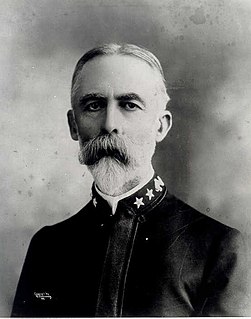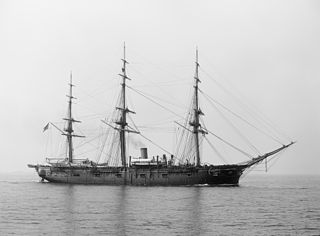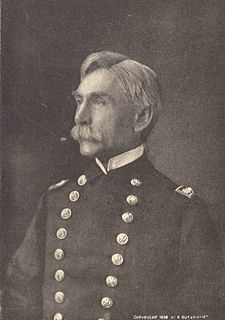
William Thomas Sampson was a United States Navy rear admiral known for his victory in the Battle of Santiago de Cuba during the Spanish–American War.

Rear Admiral Lewis Ashfield Kimberly was an officer in the United States Navy during the American Civil War and the years following.

Arent Schuyler Crowninshield was a rear admiral of the United States Navy. He saw combat during the Civil War, and after the war held high commands both afloat and ashore.

Edward David Taussig was a decorated Rear Admiral in the United States Navy. He is best remembered for being the officer to claim Wake Island after the Spanish–American War, as well as accepting the physical relinquishment of Guam by its indigenous governor following the Treaty of Paris in which Spain ceded Guam to the United States following nearly 300 years of colonial rule. Taussig briefly served as Governor of Guam. He was the first of a four-generational family of United States Naval Academy graduates including his son, Vice Admiral Joseph K. Taussig (1877–1947), grandson Captain Joseph K. Taussig Jr. (1920–1999), and great-grandson, Captain Joseph K. Taussig USMC (1945–).

Rear Admiral George Henry Wadleigh served in the United States Navy during the American Civil War and the Spanish–American War.

The first USS Lancaster was a screw sloop-of-war in the United States Navy during the American Civil War through the Spanish–American War.

Albert Smith Barker was an admiral in the United States Navy who served during the American Civil War and the Spanish–American War.

George Eugene Belknap was a rear admiral in the United States Navy. USS Belknap (DD-251) was named for him.

Rear Admiral Bowman Hendry McCalla was an officer in the United States Navy, who was noted for his roles in the Spanish–American War and putting down the Boxer Rebellion.

Rear Admiral Charles Edgar Clark was an officer in the United States Navy during the American Civil War and the Spanish–American War.

Henry Glass was a rear admiral in the United States Navy, best remembered for his role in the bloodless capture of Guam in the Spanish–American War. He was also a Union veteran of the American Civil War.

John Crittenden Watson was an admiral of the United States Navy.

Rear Admiral Spencer Shepard Wood was a United States Navy officer. His career included service in the Spanish–American War and World War I, command of battleships and cruisers, and duty as an aide to a number of senior naval leaders.

Yates Stirling was a rear admiral in the United States Navy.
Rear Admiral John Hubbard was an officer in the United States Navy. He fought in the Spanish–American War, played a prominent role in the independence of Panama from Colombia in 1903, and served as Commander-in-Chief of the United States Asiatic Fleet.

Rear Admiral Frederick W. Rodgers was an officer in the United States Navy. He fought in the American Civil War and rose to be the last commander of the Asiatic Squadron. He was a grandson of U.S. Navy Commodore Matthew C. Perry.

Rear Admiral William Mayhew Folger was an officer in the United States Navy. He served in the American Civil War without seeing action. He filled a wide range of roles, including Chief of the Bureau of Ordnance, over the following 30 years. He fought in the Spanish–American War as captain of the protected cruiser USS New Orleans. Folger served as a lighthouse inspector before becoming commander of the Philippine Squadron during the Philippine–American War, and was briefly Commander-in-Chief of the United States Asiatic Fleet. He retired in 1905 as a rear admiral.

Rear Admiral Reginald Fairfax Nicholson was an officer in the United States Navy. He fought in the American Civil War and Spanish–American War, was Commander-in-Chief of the United States Asiatic Fleet, and came out of retirement during World War I to serve as the first U.S. naval attaché to Ecuador and Peru. He retired as the last active-duty U.S. Navy officer to have served in the American Civil War.

John Russell Bartlett (1843–1904) was an American naval officer and oceanographer.

Francis John Higginson was an officer in the United States Navy during the American Civil War and Spanish–American War. He rose to the rank of rear admiral and was the last commander-in-chief of the North Atlantic Squadron and first commander-in-chief of the North Atlantic Fleet.
















